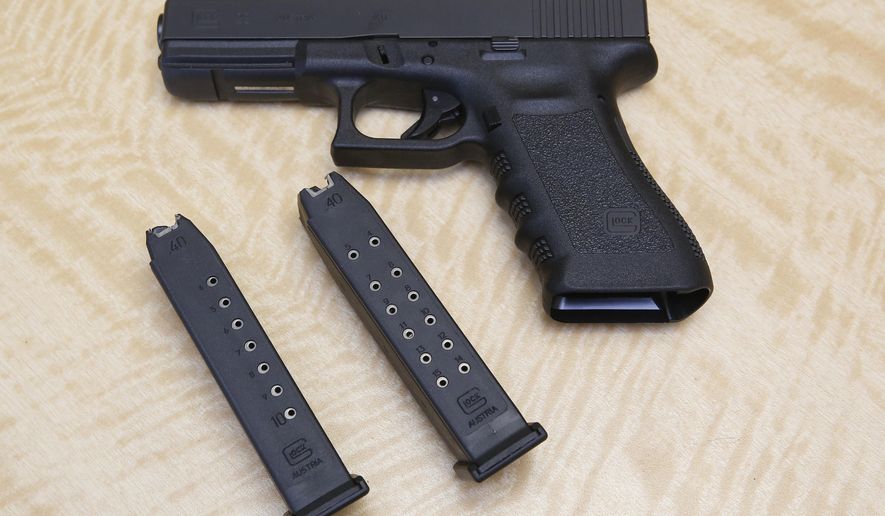SACRAMENTO, Calif. (AP) - California politicians’ attempts to strengthen some of the nation’s strictest gun laws suffered two setbacks this week - the latest when a federal judge blocked a law set to take effect Saturday barring gun owners from possessing ammunition magazines holding more than 10 bullets.
They present new challenges for freshman state Attorney General Xavier Becerra, who took office in January. He’s running his first statewide campaign as he seeks re-election next year to the post he now holds by appointment after his predecessor was elected to the U.S. Senate.
The stalled laws were also championed by Lt. Gov. Gavin Newsom, who is campaigning for governor, and Senate President Pro Tem Kevin de Leon, who may seek higher office when he is termed out of the Senate next year.
The rival Democrats engaged in a public feud last year over ownership of the gun control issue as California voters also approved the magazine ban last fall.
The new developments do little to change the political landscape or voters’ strongly held opinions, and they may help all three Democrats campaigning in a state where gun restrictions are popular, Stanford Law School professor David Sklansky said.
“But it’s also not an issue that will wind up dividing them much from other Democrats who are running for office,” Sklansky said.
The setbacks come as another mass shooting unfolded at a New York City hospital on Friday, with the slain assailant concealing a rifle beneath a white lab coat.
San Diego-based U.S. District Judge Roger Benitez ruled Thursday that the high-capacity magazine ban takes away gun owners’ Second Amendment rights and amounts to the government seizing people’s private property without compensation.
California law has prohibited buying or selling the magazines since 2000, but until now allowed those who already owned them to keep them.
The judge was harshly critical of the reasoning behind banning magazines, and particularly of legal arguments by Becerra’s office that the ban would help thwart mass shooters because they would have to stop shooting to reload more frequently.
“It appears on this record to be a haphazard solution likely to have no effect on an exceedingly rare problem,” wrote Benitez, an appointee of Republican President George W. Bush.
But on the same day, Sacramento-based U.S. District Court Judge William Shubb, an appointee of Republican George H.W. Bush, backed the ban and rejected arguments by different gun owners’ rights groups.
Shubb, like Becerra, listed as examples recent mass shootings in Orlando, Florida; San Bernardino; at Sandy Hook Elementary School in Newtown, Connecticut; and the Arizona attack that killed six while wounding former U.S. Rep. Gabrielle Giffords.
Earlier this week, California regulators also temporarily blocked Becerra’s proposed new rules on assault weapons, saying he went too far in trying to impose the new regulations without allowing for public comment.
Becerra’s office is developing regulations on how current California owners of soon-to-be-illegal assault-style weapons can keep them if they’re registered starting in July 2018.
Both the magazine ban and new assault weapon restrictions were included in legislation last year. Voters strengthened penalties for the magazine ban with their approval in November of Newsom’s Proposition 63, which also included other gun control measures.
Owners could have faced fines or jail time if they didn’t get rid of their magazines or alter them to hold no more than 10 bullets. Owners can now keep the magazines until a final ruling by Benitez or if an appeals court overturns his injunction.
Newsom blamed “a wave of lawsuits filed by the gun lobby as part of their orchestrated campaign to dismantle public safety laws and overturn the clear will of California voters.”
De Leon called the San Diego judge’s opinion absurd. Both men predicted it will be overturned because similar restrictions have been upheld elsewhere.
Becerra hasn’t said what he will do next on either setback. But he promised to “defend the will of California voters.”
Politicians in both liberal and conservative states feel the need to act whenever there is another mass shooting, University of California, Berkeley, law professor Frank Zimring said.
Yet lawmakers nationwide are now making largely incremental changes because their existing gun laws already are so permissive or restrictive, Zimring said. In Republican states, politicians have moved to allow concealed weapons in classrooms, bus stations or on college campuses.
Politicians of both political parties wind up passing “emotionally symbolic but operationally quite modest” proposals, he said.
“That’s exactly where California is,” Zimring said. “And from the standpoint of political symbolism, having a fight on the implementation is a plus for the people who passed the law, not a minus.”




Please read our comment policy before commenting.